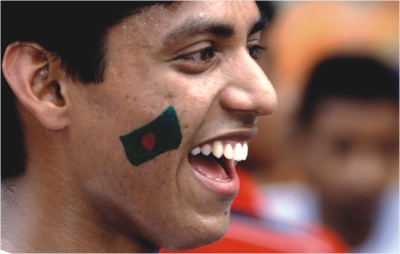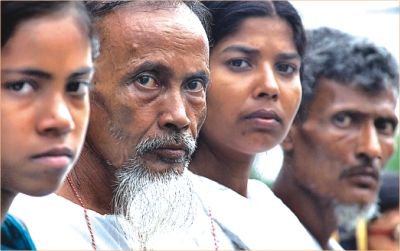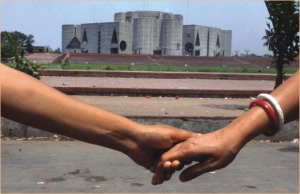
Inside
|
What is democracy? Preliminary findings from a national survey What does democracy mean to the common man and woman? Imtiaz Ahmed and Munim Kumar Barai poll the country to find out
Save for the fact that the word "democracy" comes from the Greek words demos meaning "people" and kratos meaning "authority" or "power" there has been little agreement amongst scholars, researchers and politicians, indeed, both within and outside countries, regimes and cultures, when it comes to the issue of defining democracy. In fact, a plethora of definitions ranging from procedural, substantive, Athenian, social, participatory, realist, deliberative, and many more has come to mar, and at times even smear, the meaning of democracy. In Bangladesh, with nearly 140 million people, although not speaking in too many languages, the task of defining and understanding democracy has hardly remained free from complexities. Yet, over the years the Bangladeshis have come to accept this global ideal with largely, although not quintessentially, alien origins as their own commonsense, and have imbued it with positive meaning. In this process they have, drawing upon the egalitarian tradition within the West, radicalized the idea of democracy and made it carry an additional normative burden. A closer look at the functioning of democracy in Bangladesh brings out the fact that democracy here has been manipulated through hierarchichal setups and Western-oriented privileged classes. A host of factors including disorder and manipulation in the electoral processes, weak legislations, democratically non-literate voters, bureaucratic hurdles and structural disorders were the key elements hampering the smooth functioning of democracy in Bangladesh. Moreover, military intervention, politically driven judiciary and dependent election commissions, etc. together weakened democracy and people's rights. Though a vital change in the process of empowerment of the people was required in the discourse of democracy and ensuring the rights of the people, unfortunately that has not happened. Also structural continuity of democracy, keeping civil-military relations within limits, choice of honest and competent representatives through a standard process, continuity of leadership, strong political parties and drafting of social rights for the people could have led to a sustainable practice of democracy in Bangladesh. But the latter got handicapped because of the absence of one, or many, of the variables. Against this background, the understanding of democracy from the viewpoint of values and intellectual convictions may significantly differ from the understanding of democracy by different segments of people. Their support for democracy does not tell us much about what is this "democracy" they support. There are various competing and overlapping conceptions that inform popular usage of democracy. The survey on the State of Democracy, as part of a South Asian survey carried out in December 2004 - January 2005 by the Centre for Alternatives in collaboration with other regional centers, brings out the differences in perception of democracy and other related topics from the standpoint of locality, religion, gender, age, and education. According to the survey, democracy is understood as "equality, liberty, and freedom" by the largest section of the respondents (11.9 percent), followed by the recognition of its fundamentals like "free and fair elections, rule of law, human rights" (9.5 percent). Many of the respondents (9.0 percent) understood it in popular terms, that is, democracy is "people's power, rule of people, care for people and public opinion," and so on. While attempting to identify the core element of democracy, the survey found that about 6 percent of the respondents thought it meant "free and fair elections." Interestingly, only 1.2 percent saw democracy in terms of "good governance." But more surprisingly, if not shockingly, the bulk of the respondents (43.6 percent) had no idea about the meaning of democracy.
Do men and women think differently on the meaning of democracy? No concrete evidence could be gathered from the results of the survey on this account, either in favour of or against such a question. Compared to female respondents, however, a larger section of the male respondents understand democracy as equality, liberty, and freedom (2.2 percent and 17.5 percent respectively). The female respondents, on the other hand, found the popular meaning of democracy (that is, "people's power, rule of people, care for people and public opinion") more fitting (although percentage-wise only 6.5 percent). A vast majority of them (56.6 percent) did not know the meaning of democracy. The male figure on this issue, however, is only relatively better (29.7 percent had no knowledge of democracy). Democracy as part of political commonsense in South Asia, or what Amartya Sen refers to as "public reasoning," is now much beyond formal literacy. But then, when it comes to defining democracy the non-literate people have a higher preference for procedural democracy, like "periodic elections," while school or college level educated people prefer "equality, liberty, and freedom" as the preferred meaning of democracy. Of the 980 non-literate respondents out of the total of 2,252, fully 61 percent could not come out with any meaning of democracy, while 6.1 percent understood democracy in terms of its fundamentals (that is, "free and fair elections, rule of law, human rights"), 4.2 percent meant democracy in popular terms (that is, "people's power, rule of people, care for people and public opinion") and 3.6 percent meant "liberty, equality, and freedom." Among the literate respondents, out of 1,272 about 19 percent meant democracy as "equality, liberty, and freedom," 12.7 percent identified democracy in popular terms while 12 percent understood democracy in terms of its fundamentals. Interestingly, the meaning of democracy gets a higher negative appraisal among the literates than their non-literate brothers and sisters. Probably the higher exposure of the literates to the political process has made them more pessimistic about the system. An age-wise distribution was made to see whether there are any fundamental differences in understanding democracy among the respondents. Data for two groups were generated for this -- one, 25 years and below, while the other, 55 years and above. The comparison between the two age groups makes it clear that there are no significant differences between them. They differ marginally in understanding democracy in terms of fundamentals and "equality, liberty, and freedom" in particular. While the lower age group had a tendency to understand democracy as "equality, liberty, and freedom" (15 percent against 11.4 percent of higher age group), the higher age group respondents meant "election" as the meaning of democracy (5.9 percent against 3.9 percent of lower age group). Overall, the lower age group showed marginally better performance in giving a meaning to democracy than the higher age group. This is indicative of the fact that they have a higher literacy rate than the older respondents.A region-wise analysis of the survey brings out some interesting observations about the understanding of democracy in different administrative regions of Bangladesh. The respondents of Sylhet and Barisal regions have shown a higher level of awareness of democracy, followed by that of Dhaka region. The respondents of Chittagong and Rajshashi regions turned out to be most unaware of the concept, as about 50 percent of the respondents of both the regions failed to give any meaning to democracy. Rate of literacy was initially thought to be the main reason for this, but that may not entirely explain the cause, as Sylhet is the most non-literate zone in Bangladesh. However, democracy has the highest meaning as "equality, liberty, and freedom" in Barisal region (18.6 percent) followed by Dhaka (14.8 percent), Sylhet (13.6 percent), and Chittagong (11.5 percent). Again, respondents in Sylhet (6.8 percent) and Barisal (4.8 percent) understood democracy as the rule of people. Understandably, the meaning of democracy is equated with "free and fair elections" as it is the most exercised means through which the respondents, like most of the people in the country, enjoy democracy. This is reflected throughout the country. What is the meaning of democracy to the minorities in Bangladesh? With 595 respondents, with about equal numbers from Hindu, Garo, and Hill-people communities (as part of a booster survey), there was an attempt to take up this question. The respondents of these communities seem to be more conscious about the meaning of democracy as 70 percent of them gave some kind of response to this question. Majority of them (19.7 percent) understand democracy as "equality, liberty and freedom" while 16 percent of them understood democracy in popular terms. Again, "free and fair elections" was understood as democracy by about 8 percent of the respondents. The understanding of democracy therefore remained very much in line with the overall understanding of democracy found in the country. The survey also opined in favour of democratic futures. When three statements were given to the respondents for identifying the most agreed one from them, 38.8 percent identified that "democracy is preferable to any other kind of government." But the level of despondency with democracy was also reflected in the response as 14.3 percent of the respondents said that "it does not matter to people like them whether they had democratic or non-democratic governance." Only 4 percent replied that "in certain situations, a dictatorial government could be preferable to a democratic one." Interestingly, 38.2 percent of the respondents could not understand the question.What are the essential characteristics of democracy? To this question, the respondents were more vocal and Does a weaker section of the population get better treatment in a democracy? This is a thorny issue to tackle, but when asked "what they like about democracy" the majority of the respondents (55.3 percent) said that "the weak are treated with dignity." 23.5 percent of the respondents, however, like democracy because "everyone is free to speak and act." Only 5.8 percent of the respondents favour democracy because "people have control over the rulers." A correlation between corruption and democracy was also found in the survey. 29.4 percent of the respondents "dislike" democracy because "corruption increases" in a democracy. Again, 24.7 percent of the respondents "dislike" democracy because "those who have more votes dominate over others." "Rulers keep changing" was also viewed as a negative attribute of democracy (10.5 percent), while 7.2 percent of the respondents "disliked" democracy because "too many parties divide the people." These comments are only preliminary in nature, and only deal with the meaning of democracy. The survey was more comprehensive, and surely will throw more light when the full results are computed, analyzed and discussed. What is striking here is that a high number of people are not familiar with the meaning of political democracy, although it has remained the number one in the political agenda for over half a century in this country. There is also a perceptible number of people who have given negative responses to the meaning of democracy. Noticeably, parties and elections, peace and security, and also procedural and institutional mechanisms in the understanding of democracy had a very low priority with the respondents. But then, if the less ambiguous responses, like taking democracy to mean "basic necessities like food, clothes, and shelter for everyone," "equal rights to everyone," "the opportunity to change the government through elections," "freedom to criticize those in power," are all grouped together then it can be rightly concluded that the respondents, in overwhelming numbers (84 per cent), have given some indication as to what democracy is all about in Bangladesh. Are the politicians and policymakers ready to heed their call? Imtiaz Ahmed is Professor of International Relations, University of Dhaka, and Munim Kumar Barai is Associate Professor of Business, University of Liberal Arts of Bangladesh. Photos: Star |


 had varied responses. The bulk of them (44.4 percent) saw democracy guaranteeing "basic necessities like food, clothes and shelter for everyone," followed by "equal rights to everyone" (25.9 percent). A good number of them (10.3 percent) identified democracy with an "opportunity to change the government through elections."
had varied responses. The bulk of them (44.4 percent) saw democracy guaranteeing "basic necessities like food, clothes and shelter for everyone," followed by "equal rights to everyone" (25.9 percent). A good number of them (10.3 percent) identified democracy with an "opportunity to change the government through elections."